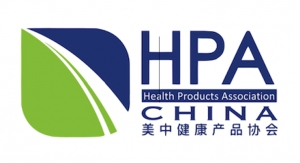08.31.15
The U.S. – China Health Products Association (USCHPA) has submitted a regulatory question and comment paper to China’s Food and Drug Administration (CFDA). The association’s regulatory paper was in response to CFDA’s release in July of three draft documents — Health Function Claim Directory and Material Inventory; Measures on Management of Health Food Labeling; and Measures for the Registration and Filing of Health Food— scheduled to restructure the health product (dietary supplement) industry.
The translation of the above documents can be viewed on the association’s website under Regulatory Updates.
The association said it is happy to see China reforming the supplement industry, adding it has been a chaotic and extremely difficult regulatory system to follow for all involved and has been in desperate need of restructuring.
The two most important changes CFDA will be implementing is the creation of a product filing system and an approved raw ingredient catalog.
The filing system is supposed to be akin to a type of notification system. However, only vitamins, minerals and some other select nutrients will be allowed to use the filing system. USCHPA said this should help to increase transparency and speed of entry to market. Unfortunately, the organization said, it looks as thought products containing complex formulas, especially those containing botanicals, will still have to go through the current registration process, which typically costs in excess of $80k per SKU and can take up to three years to finalize. USCHPA is hoping this registration process will also see some streamlining and much needed transparency.
The approved raw material catalog will be created by CFDA in conjunction with the National Health and Family Planning Commission. This list will help industry better understand exactly what ingredients they are allowed to use when formulating their finished products.
Among the many issues raised by USCHPA to CFDA, two of the most significant are:
· The need of imported products to have a record of sales and marketing of at least one year in the country of origin prior to attempting entry, as well as show the results of three consecutive batch records. This is not required for domestic companies and is a form of non-tariff barrier to trade, according to the organization.
· There is wording that states imported products are expected to follow China’s quality standards and that on-site inspections would not be out of the question. This wording needs clarification, USCHPA said, but could require foreign manufacturers to follow Chinese GMP standards for health food products, which would certainly be problematic.
For more information visit www.uschinahpa.org
The translation of the above documents can be viewed on the association’s website under Regulatory Updates.
The association said it is happy to see China reforming the supplement industry, adding it has been a chaotic and extremely difficult regulatory system to follow for all involved and has been in desperate need of restructuring.
The two most important changes CFDA will be implementing is the creation of a product filing system and an approved raw ingredient catalog.
The filing system is supposed to be akin to a type of notification system. However, only vitamins, minerals and some other select nutrients will be allowed to use the filing system. USCHPA said this should help to increase transparency and speed of entry to market. Unfortunately, the organization said, it looks as thought products containing complex formulas, especially those containing botanicals, will still have to go through the current registration process, which typically costs in excess of $80k per SKU and can take up to three years to finalize. USCHPA is hoping this registration process will also see some streamlining and much needed transparency.
The approved raw material catalog will be created by CFDA in conjunction with the National Health and Family Planning Commission. This list will help industry better understand exactly what ingredients they are allowed to use when formulating their finished products.
Among the many issues raised by USCHPA to CFDA, two of the most significant are:
· The need of imported products to have a record of sales and marketing of at least one year in the country of origin prior to attempting entry, as well as show the results of three consecutive batch records. This is not required for domestic companies and is a form of non-tariff barrier to trade, according to the organization.
· There is wording that states imported products are expected to follow China’s quality standards and that on-site inspections would not be out of the question. This wording needs clarification, USCHPA said, but could require foreign manufacturers to follow Chinese GMP standards for health food products, which would certainly be problematic.
For more information visit www.uschinahpa.org
















